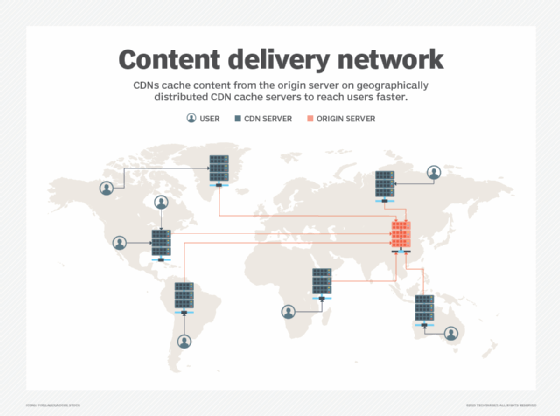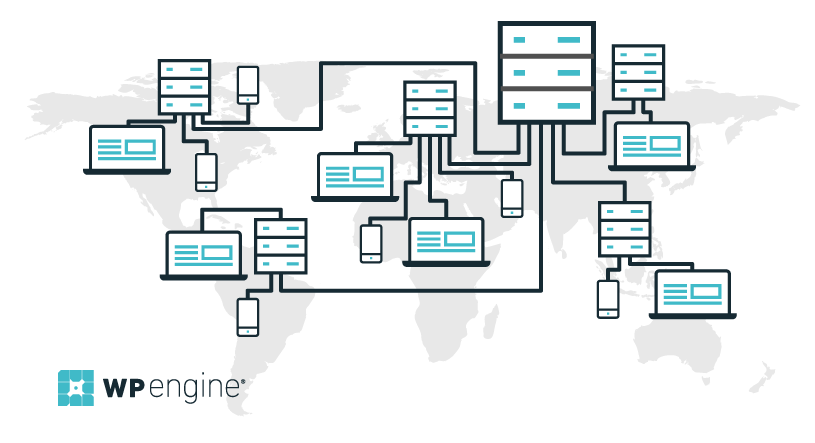A CDN, or Content Delivery Network, speeds up the delivery of web content. It distributes data across various servers worldwide.
In hosting, a CDN is crucial. It helps websites load faster by reducing the distance between users and server locations. Think of a CDN as a network of servers spread out globally. When someone visits your website, the CDN delivers content from the server closest to them.
This minimizes load time and enhances user experience. CDNs also provide security benefits by protecting against traffic spikes and cyber attacks. Understanding CDNs is essential for anyone managing a website. In this post, we will explore what CDNs are, how they work, and why they are important for hosting.

Credit: www.techtarget.com
How Cdn Works
Understanding how a Content Delivery Network (CDN) works is essential for website owners. A CDN speeds up the delivery of your website’s content. It uses a network of servers worldwide. These servers store copies of your content. Let’s dive into the details of how a CDN works.
Content Distribution
The CDN’s main job is content distribution. It spreads your website’s data across many servers. These servers are called Points of Presence (PoPs). PoPs are in different locations around the globe. When a user visits your site, the CDN delivers content from the nearest PoP. This reduces the distance data travels and speeds up loading times.
Caching Mechanism
CDNs use a caching mechanism to store content. Caching means saving copies of your website’s files on different servers. When a user requests a page, the CDN serves the cached version. This process reduces the load on the main server. It also makes the website faster. Cached content includes images, videos, and HTML files.
Types Of Cdn
When discussing Content Delivery Networks (CDNs), understanding the types available is key. There are two primary types: Push CDN and Pull CDN. Each serves unique purposes and functions differently. Knowing their differences can help you choose the right one for your needs.
Push Cdn
A Push CDN requires you to upload your content to the CDN server. Once uploaded, the CDN distributes the content to various locations. This ensures quick access for users. You control what and when content is uploaded. This method is ideal for static content that doesn’t change often.
Pull Cdn
A Pull CDN works differently. The CDN retrieves content from your origin server when a user requests it. Then, it caches the content for future requests. This means the CDN only stores what is needed. It reduces the load on your origin server. This method works well for dynamic content that changes frequently.
Benefits Of Using Cdn
A Content Delivery Network (CDN) can greatly enhance your website’s performance. By distributing content to servers worldwide, a CDN ensures faster load times. This is crucial for keeping visitors engaged and improving user experience. Below, we explore the main benefits of using a CDN.
Improved Performance
One of the primary benefits of using a CDN is improved performance. Here are some key points:
- Faster Load Times: Content is served from a server closest to the user.
- Reduced Latency: Minimizes the time data travels across the network.
- Efficient Load Balancing: Distributes traffic evenly across multiple servers.
In a study, websites using a CDN experienced up to 60% faster load times. This can make a significant difference in user satisfaction and conversion rates.
Enhanced Security
Using a CDN also enhances website security. CDNs offer several security features:
| Security Feature | Benefit |
|---|---|
| DDoS Protection | Mitigates Distributed Denial of Service attacks. |
| Web Application Firewall | Blocks malicious traffic and protects data. |
| SSL/TLS Encryption | Secures data transfer between server and user. |
These features help protect your website from various cyber threats. As a result, your site remains secure and trustworthy for users.

Credit: wpengine.com
Cdn Architecture
The architecture of a Content Delivery Network (CDN) is a key factor in how it speeds up the delivery of web content. This system comprises multiple components working together to optimize content delivery. Let’s dive into the essential parts of CDN architecture.
Edge Servers
Edge servers are crucial to a CDN. These servers are strategically placed in various locations across the globe. They store cached versions of your website’s content. When a user requests data, the nearest edge server responds. This reduces the distance the data has to travel. The result is faster load times and a better user experience.
Points Of Presence (pops)
Points of Presence (PoPs) are another vital component. A PoP is a data center where multiple edge servers are located. CDNs have many PoPs globally. These ensure that no matter where your users are, they receive content quickly. The more PoPs a CDN has, the broader its reach and efficiency.
Consider the following table which illustrates the difference between edge servers and PoPs:
| Edge Servers | Points of Presence (PoPs) |
|---|---|
| Strategically placed globally | Data centers housing edge servers |
| Store cached content | Enhance content delivery speed |
| Reduce data travel distance | Improve global reach |
To summarize, edge servers and PoPs work together to enhance the performance of a CDN. By understanding these components, you can appreciate how a CDN improves content delivery and user experience.
Cdn And Seo
Understanding the connection between a CDN (Content Delivery Network) and SEO is crucial for website owners. A CDN can greatly affect your website’s performance and, in turn, its search engine ranking. Let’s explore how a CDN impacts your site’s SEO.
Boosting Page Speed
One of the main benefits of using a CDN is the boost in page speed. Faster websites provide a better user experience. A CDN distributes content across multiple servers around the world. This ensures that users can access data from a server close to their location. Shorter distances mean quicker load times.
Search engines like Google use page speed as a ranking factor. A faster loading site is likely to rank higher. This can lead to more organic traffic and better user engagement. In short, a CDN can help your site load faster and rank better.
Impact On Search Rankings
Search engines prioritize user experience. A key part of this is how quickly users can access a site. A CDN ensures that content is delivered quickly and reliably. This can reduce bounce rates and increase the time users spend on your site.
High bounce rates can negatively impact search rankings. If users leave a site quickly, search engines may view this as a signal of poor quality. A CDN can help keep users on your site longer. This improves your site’s reputation with search engines.
Additionally, a CDN can handle large traffic spikes more efficiently. This means your site remains accessible even during high traffic periods. Consistent uptime and performance can positively influence your search rankings.
Popular Cdn Providers
Popular CDN providers enhance website performance and security. These providers use a network of servers to deliver content quickly. They ensure that users get fast and reliable access to websites.
Akamai
Akamai is a leading CDN provider. It offers a vast network of servers worldwide. Akamai excels in speed and security. Many large companies use Akamai for their websites. Akamai’s services help reduce load times. They also protect against cyber threats. Akamai is known for its reliability.
Cloudflare
Cloudflare is another popular CDN provider. It provides both free and paid plans. Cloudflare has a large server network. It offers excellent performance and security features. Cloudflare helps improve website load times. It also protects websites from attacks. Many businesses trust Cloudflare for their CDN needs.
Choosing The Right Cdn
Choosing the right CDN can be a daunting task. There are many options available, each with its own set of features and benefits. It is crucial to make an informed decision to ensure your website performs optimally and delivers content quickly to users worldwide.
Factors To Consider
Several factors can influence your choice of CDN. The first is the network coverage. A CDN with a wide global presence ensures faster content delivery. Another factor is performance. Check for CDNs with low latency and high availability.
Security features are also important. Look for CDNs that provide protection against DDoS attacks and offer SSL certificates. Scalability is another key factor. Your CDN should be able to handle traffic spikes without compromising performance.
Cost Vs. Benefits
Cost is a critical aspect when selecting a CDN. Some CDNs offer pay-as-you-go plans, which can be cost-effective for smaller websites. Others may have fixed pricing based on usage tiers. Evaluate the pricing models and see which one aligns with your budget.
While considering cost, also weigh the benefits. A good CDN can improve user experience by reducing load times. It can also enhance security and provide analytics to monitor traffic. Balance the cost against these benefits to make a wise choice.
Credit: en.wikipedia.org
Frequently Asked Questions
What Is A Cdn In Hosting?
A CDN, or Content Delivery Network, speeds up the delivery of web content. It distributes content across multiple servers globally.
How Does A Cdn Work?
A CDN works by caching content on servers near users. This reduces latency and ensures faster load times.
Why Use A Cdn For My Website?
Using a CDN improves website speed, enhances user experience, and can reduce server load. It also provides better security.
Is A Cdn Necessary For Small Websites?
A CDN can benefit small websites by improving load times and security. It’s particularly useful for sites with a global audience.
Conclusion
A Content Delivery Network (CDN) greatly improves website speed and reliability. It ensures faster load times and better user experience. Using a CDN helps reduce server load and bandwidth costs. It also increases website security by mitigating DDoS attacks. In short, a CDN is essential for any website aiming for optimal performance.
Choose a reliable CDN provider to enjoy these benefits. Optimize your website now with a CDN.